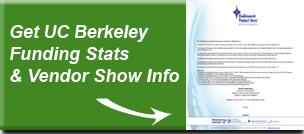 Synthetic biology is the application of engineering principles to altering components of biological systems, like genes and cells, towards creating new and revised living things (watch the video below for an introduction). It's arguably the most radical, cutting-edge laboratory science field today, and one that calls on its scientists to grapple with ethics as well as biotechnology. At the forefront of this life science revolution is the University of California Berkeley-led consortium SynBERC: the Synthetic Biology Engineering Research Center, with partner colleagues at UCSF, Stanford, MIT, and Harvard. Just this week, principal synbio investigators from these institutions came together with industry scientists and ethicists for a symposium on the UCB campus titled Programming Life: the revolutionary potential of synthetic biology, co-sponsored by SynBERC and Discover Magazine. Whether we are going to continue down the road of reengineering life was not the question so much as how we will go about that delicate task and what the implications and promises are of such a bold project.
Synthetic biology is the application of engineering principles to altering components of biological systems, like genes and cells, towards creating new and revised living things (watch the video below for an introduction). It's arguably the most radical, cutting-edge laboratory science field today, and one that calls on its scientists to grapple with ethics as well as biotechnology. At the forefront of this life science revolution is the University of California Berkeley-led consortium SynBERC: the Synthetic Biology Engineering Research Center, with partner colleagues at UCSF, Stanford, MIT, and Harvard. Just this week, principal synbio investigators from these institutions came together with industry scientists and ethicists for a symposium on the UCB campus titled Programming Life: the revolutionary potential of synthetic biology, co-sponsored by SynBERC and Discover Magazine. Whether we are going to continue down the road of reengineering life was not the question so much as how we will go about that delicate task and what the implications and promises are of such a bold project.
[The symposium program cover, courtesy of Discover Magazine]
One of the pioneers in this biological revolution is UC Berkeley chemical engineer Jay Keasling, introduced by the symposium moderator as someone “who in his spare time goes out and tries to build stuff that will cure malaria, and biofuels and the next generation of clean tech, all while mentoring students at this university and at the national labs and creating whole new fields of science.” Keasling's research interests are in many ways representative of the direction of the field right now. The first marketable product of synbio technology is a synthetically-based malaria drug, designed to replicate the popular drug artemisinin and make it more widely available. Developed by a private company as a result of work in the Keasling Lab, it will come out this year. Like many synbio creations, it is yeast-based.
Another promising area of synthetic biology research is in the development of biofuels from unutilized biomass. "Produced from natural biosynthetic pathways that exist in plants and a variety of microorganisms," according to the Keasling lab website, one of the major advantages of synbio fuel over other biofuels is that it will be usable within our current transportation infrastructure. You could run it through existing pipelines, dispense it at the corner gas station, and put it in your older model automobile and it would run with the same efficiency as petroleum. Indeed, replacing petroleum in its myriad uses in industry currently is one of the larger aims of synthetic biology and the SynBERC collaborative.
On the ethical side of the discussion, the consensus seems to be that the world's resource problems are too critical not to attempt to remedy them with synthetic manipulation, and we need to culture in scientists the capacity and willingness to engage the big moral and ethical questions that accompany their work. Stanford bioengineer and symposium speaker Drew Endy put it this way, in the UCB press release:
“What I would like to imagine as a longer-term encompassing vision is that humanity figured out how to reinvent the manufacturing of the things we need so that we can do it in partnership with nature; not to replace nature, but to dance better with it in sustaining what it means to be a flourishing human civilization.”
[An introduction to synthetic biology, courtesy of TechNYou]
Biotechnology Calendar, Inc. looks forward each year to meeting with researchers from UCB's life science community and its affiliates on campus at its annual Berkeley BioResearch Product Faire™ tradeshow event, to be held next on June 5, 2013. For information on exhibiting, and to receive a free funding report for UCB, click here:
Biotechnology Calendar, Inc. is a full-service event marketing and planning company producing on-campus life science research tradeshows nationwide for going on 21 years. We plan and promote each event to bring the best products and services to the best research campuses across the country. Life science researchers, purchasing agents, and lab managers are actively invited to attend to see the latest products and equipment and discuss their laboratory tool and service needs. See our Nationwide Show Schedule for 2013.


